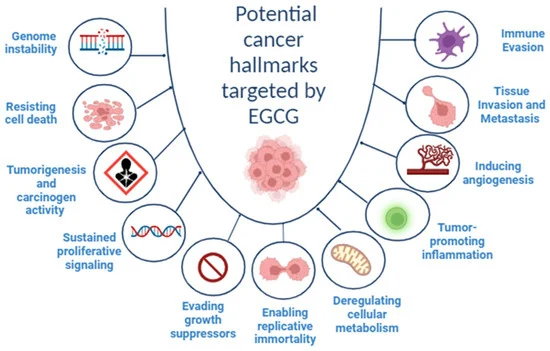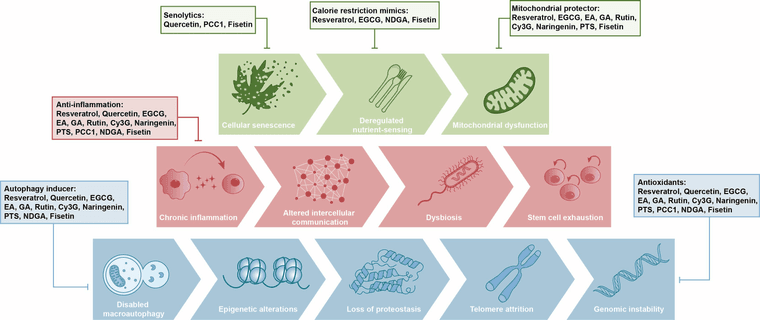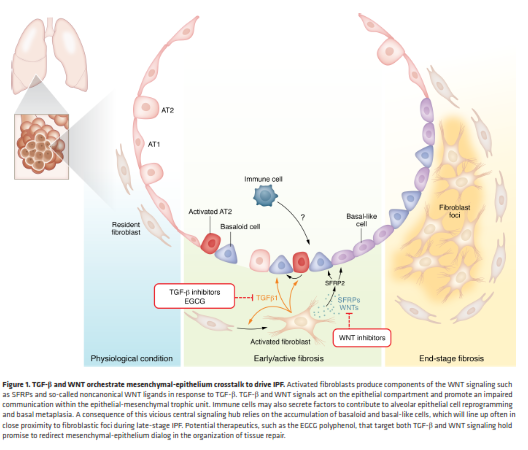Green tea and EGCG
-
I have recently started to brew green tea again. I have not noticed any changes; but I assume that there are positive effects occurring 'under the hood'. Here are some 2024 articles that inspired my action.
Abstract
Epigallocatechin gallate (EGCG) is a catechin, which is a type of flavonoid found in high concentrations in green tea. EGCG has been studied extensively for its potential health benefits, particularly in cancer. EGCG has been found to exhibit anti-proliferative, anti-angiogenic, and pro-apoptotic effects in numerous cancer cell lines and animal models. EGCG has demonstrated the ability to interrupt various signaling pathways associated with cellular proliferation and division in different cancer types. EGCG anticancer activity is mediated by interfering with various cancer hallmarks. This article summarize and highlight the effects of EGCG on cancer hallmarks and focused on the impacts of EGCG on these cancer-related hallmarks. The studies discussed in this review enrich the understanding of EGCG’s potential as a therapeutic tool against cancer, offering a substantial foundation for scientists and medical experts to advance scientific and clinical investigations regarding EGCG’s possibility as a potential anticancer treatment.

Conclusions
Based on this meta-analysis, green tea intake had a significant lowering effect on the risk of developing liver cancer and had a significantly improving effect on body mass index, liver enzymes, and lipoprotein compared to no green tea intake. These results suggest that green tea may be added to the daily dietary program to improve cardiovascular status with no possible risk of liver cancer. It even may have a protecting effect against liver cancer in the usual daily number of cups.
-
@DavidPS
Yeah I can get into this. I go on off with green teas. Mostly drink ripe pu ehr tea. Very different. I like the thing you shared about lunch fibroses. Feeling some tightness in my chest lately because it hasn’t rained in my area for over two months. The earth is bone dry… I mean we did instal a whole earth array of microwave satellites, and one on every other street in my city.
Anyways, which greens are you liking best? Never been a matcha fan but maybe that’s got the most benefits because your basically eating the leaf…
Hope you are well David and thanks for the humor posts too!
-
Excerpt
EGCG has demonstrated the ability to interrupt various signaling pathways associated with cellular proliferation and division in different cancer types. EGCG anticancer activity is mediated by interfering with various cancer hallmarks.
=> I won’t take for 100 % granted.
Useful, yes. Moderation, yes. Anti-proliferation (otherwise than in an in-vitro study): Has to be confirmed in an in-vivo study with humans, not by rats.I would take the problem in another way:
We all have cancer cells when we’re older than 45. No problem if the size of the cancerous cell amount is smaller than a piece of 2 €. The body can manage.
Some physicians think cancer mode is an adaption of the metabolism to get rid of what is dysfunctional. But the problem arises when some cancerous cells refuse to die.
So, except for the digestive system (stomach, pancreas and liver) I won’t try to destroy / keep under the snuffer the whole pendulum effect of the system. Between TH1 and TH2 (Treg cells). I can give a link if desired.
Translation: Garder sous l’éteingoir = to keep under the snuffer. Under sharp control, by keeping the reaction in a lower regime.I’m gathering studies in relation with the BBB. < 10 % catechins of green tea pass the intestinal barrier. 1 % the BBB. There are 3 ways:
- Active transport
- Passive transport
- Action of polyphenol-derived metabolites
See here the action on the microbiota, since our immunity depends for 70-80 % on bacteria:
“Green Tea and Its Relation to Human Gut Microbiome”
10.3390/molecules26133907 2021 by Sergio Pérez-Burillo et al.
Antioxidant Capacity, Scavenging Capacity and Their Relation with Gut Microbiota
Picture: Influence of Green Tea on Health via Gut Microbiota.
-
@dapose - I am delighted that you enjoy the humorous postings. Comic relief is important in these stressful times.
@dapose said in Green tea and EGCG:
Anyways, which greens are you liking best?
I like well cooked collard greens, but I have not read any studies on their health effects. I believe the the important thing is to get dietary polyphenols in your diet.
Dietary Polyphenols as Anti-Aging Agents: Targeting the Hallmarks of Aging 2024

-
Peatbot: The context provided does not specifically mention epigallocatechin gallate (EGCG) by name, but it does discuss flavonoids found in green tea, which include EGCG. The context suggests that compounds in green tea, such as flavonoids, have potential health benefits. These flavonoids are said to reduce glutamate excitotoxicity, which is associated with a negative, energy-reducing state in cells. By reducing excitotoxicity, these compounds may help stabilize cells, calm them down, and reduce inflammation. Although they are called antioxidants, when these flavonoids are in the cell, they function as pro-oxidants, shifting the cell into a healthy oxidized condition. This is considered beneficial.
Therefore, based on the context, EGCG, as a flavonoid in green tea, may have health benefits related to reducing excitotoxicity and promoting a healthy cellular state.
